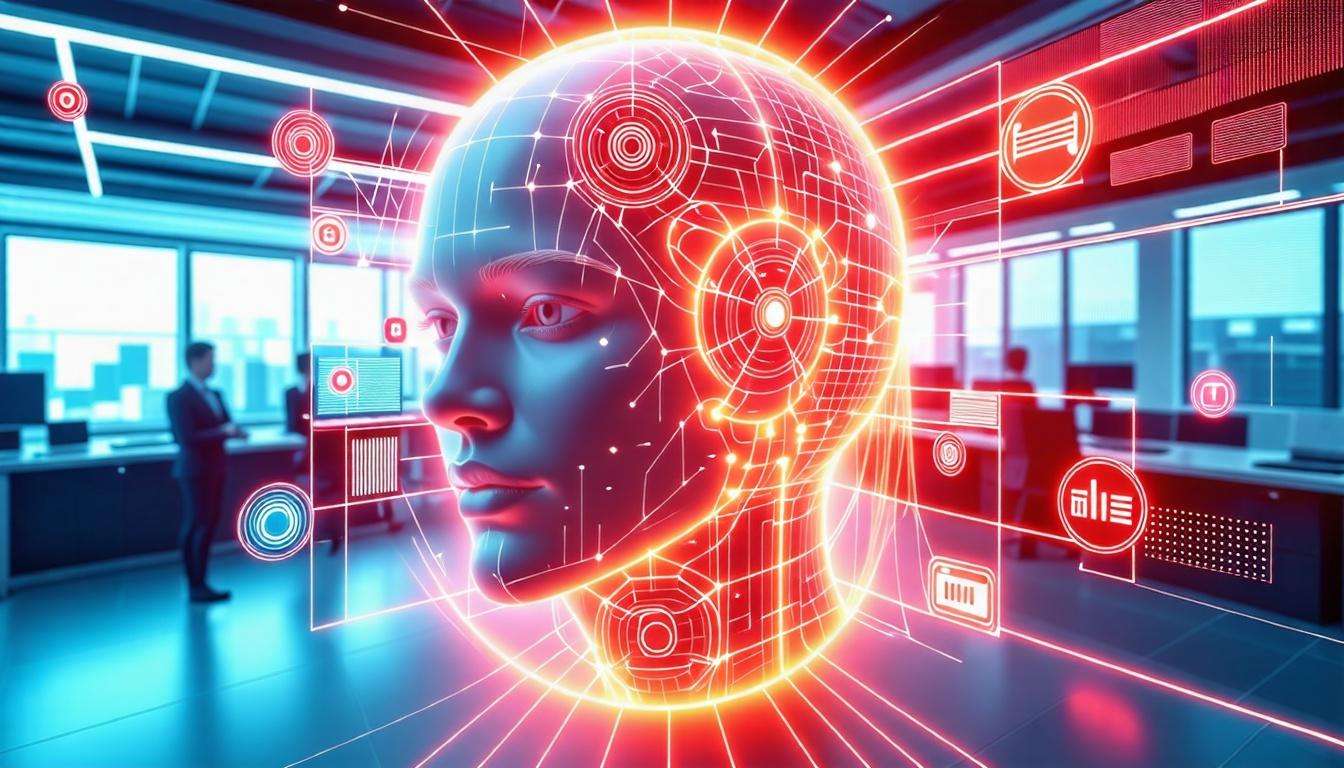We just entered 2025 and businesses will experience a major shift in their approach to artificial intelligence (AI). This evolution, termed compound AI, marks the transition from isolated AI projects to a seamless integration of AI across all operations. This collaborative approach allows diverse AI tools to work together, remarkably enhancing decision-making and operational efficiency.
As companies scale their AI adoption, they will focus on optimizing data usage. This means harnessing data analytics and automation to drive well-informed choices. With these advancements, we can expect a future where AI boosts productivity and effectiveness in the workplace.
Key Takeaways
- By 2025, companies will shift from isolated AI projects to complete, enterprise-wide systems, dramatically enhancing operational efficiency.
- Global AI investment is projected to reach $632 billion by 2028, highlighting its necessary role in shaping business strategies.
- Integrating multimodal data with AI will transform enterprise operations, improving decision-making and maximizing value.
- Increased focus on AI security and the emergence of chief AI officers will promote accountability and safety in AI deployments across organizations.
The Rise of Compound AI in Enterprises

The rise of Compound AI will reshape the business place. This powerful combination of artificial intelligence technologies, such as machine learning and data analytics, is set to transform business transformation. Imagine a workplace where AI enhances decision-making, increases operational efficiency, and automates repetitive tasks—this is rapidly becoming our reality.
Companies are integrating AI to streamline processes. For instance, predictive analytics allows businesses to forecast trends and understand customer needs, leading to smarter AI strategies that drive digital transformation and nurture innovation.
As we accept this technology, prioritizing AI ethics and governance is necessary. Responsible AI use ensures fairness and transparency. Cloud computing and workforce automation will play critical roles in redefining our work environments.
The future of work will focus on smart enterprises that use Compound AI to improve productivity and creativity while maintaining ethical standards.
Impact on Operational Efficiency and Automation
The impact of Compound AI on operational efficiency will be profound. As businesses adopt artificial intelligence and machine learning, we will move beyond basic task automation to advanced systems that improve data-driven decision-making. This shift will improve workflow automation and optimize business processes.
Integrating predictive analytics with cloud computing will empower companies to use AI applications for swift data analysis. This capability allows for faster responses and more effective strategies. For example, organizations can use intelligent automation to streamline operations, reducing costs and boosting productivity.
As we progress through digital transformation, businesses must emphasize AI ethics and governance to make sure responsible technology usage. The future workplace will feature a collaborative AI workforce, where humans and machines work together to spark creativity and innovation.
Advancements in enterprise AI will improve efficiency metrics and transform our approach to workplace challenges.
Integration of AI with Cloud Computing and Data Analytics

The integration of AI with cloud computing and data analytics is revolutionizing business operations. By 2025, a significant increase in enterprise adoption of artificial intelligence is expected. This transformation will be driven by compound AI, which combines different AI models to improve predictive analytics and business intelligence.
Companies will use cloud services to access vast big data, facilitating real-time decision-making and improved operational efficiency. For example, AI-driven solutions will automate repetitive tasks, freeing employees to focus on strategic initiatives. Here, workforce automation is necessary for streamlining processes.
As we adopt these technologies, addressing AI ethics and governance becomes critical. Ensuring fairness and transparency in AI systems is critical as they integrate into our daily lives. The rise of hybrid cloud and edge computing will provide businesses with agility and responsiveness to market changes, making 2025 a landmark year for digital transformation.
Technology | Impact |
|---|---|
AI Integration | Enhances decision-making and operational efficiency. |
Cloud Computing | Provides scalable resources for data storage and processing. |
Data Analytics | Transforms data into actionable insights. |
Transforming Business Intelligence and Predictive Analytics
A major shift in business intelligence and predictive analytics will occur, fueled by Compound AI. This state-of-the-art approach combines different artificial intelligence techniques to improve data analytics, enabling companies to improve operational efficiency and make well-informed choices.
With machine learning, businesses can analyze vast amounts of big data to uncover valuable insights. This transition marks a move from guesswork to data-driven decision-making. For example, a retail store might use predictive analytics to anticipate trending products for the upcoming season.
The rise of cloud computing democratizes access to powerful analytics tools, removing the need for expensive hardware. This accessibility allows even small businesses to use advanced AI applications and stay competitive.
As we accept this digital transformation, addressing AI ethics and governance is critical. Ensuring AI systems operate fairly and transparently is necessary. By prioritizing these principles, we can optimize the benefits of Compound AI while positively impacting our workforce and society.
AI Ethics and Governance in Enterprise Adoption
AI ethics and governance will be critical as businesses accept compound AI. This advanced artificial intelligence combines different technologies to increase automation, data analytics, and predictive analytics, enhancing operational efficiency.
As AI becomes integral to enterprise software, adopting responsible AI practices is critical. Key elements include algorithmic transparency and strong data privacy measures. Companies must create governance frameworks that prioritize bias mitigation and make sure accountability in AI systems. Building trust in AI strengthens organizational AI strategies and boosts stakeholder engagement.
Staying compliant with changing AI regulations is necessary. As businesses adapt, they will focus on ethical decision-making and sustainable AI practices. A strong commitment to digital ethics will shape the development and deployment of AI applications, promoting fairness and positive societal impact.
AI Governance Focus | Description |
|---|---|
Algorithmic Transparency | Clarifying and tracing AI decision-making processes. |
Data Privacy | Protecting user data from unauthorized access. |
Bias Mitigation | Identifying and reducing biases in AI algorithms. |
Future Technology Trends and Innovations in AI Applications
Compound AI will transform business operations. This innovative technology combines different types of artificial intelligence, resulting in smarter systems. Expect significant improvements in automation and data analytics, enabling companies to make faster, well-informed choices.
Advancements in machine learning and cloud computing will empower businesses to do AI strategies that improve operational efficiency. Imagine a restaurant where AI forecasts popular dishes based on weather patterns or local events. This is the essence of predictive analytics, which boosts customer satisfaction while reducing waste.
As AI integration becomes standard, we will see the rise of intelligent automation. AI will handle repetitive tasks, allowing employees to concentrate on creativity and customer interaction. But, it is vital to emphasize AI ethics and governance to make sure responsible technology use.
| AI Technology | Impact on Business |
|---|---|
Predictive Analytics | Enhances decision-making with data-driven insights |
Intelligent Automation | Reduces manual tasks, increasing efficiency |
Summing up
As we approach 2025, Compound AI is set to transform the business place. This advanced technology enables companies to function with greater intelligence and speed. Anticipate improved decision-making, heightened creativity, and enhanced efficiency. Imagine robots aiding customers in retail or AI optimizing the hiring process. These innovations will increase productivity and create exciting job prospects. By adopting these advancements, we can collectively forge a more dynamic and dynamic workplace for everyone.
Frequently Asked Questions
How will Compound AI change the way enterprises approach decision-making in 2025?
Compound AI will improve decision-making by integrating data insights, automating processes, and fostering creativity, driving smarter outcomes.
What impact will Compound AI have on business processes by 2025?
Compound AI will streamline operations, improve decision-making, and increase creativity, transforming business processes by 2025.
What industries are likely to be most affected by Compound AI advancements by 2025?
Industries like healthcare, manufacturing, retail, and finance will be transformed by Compound AI, enhancing efficiency and innovation.




